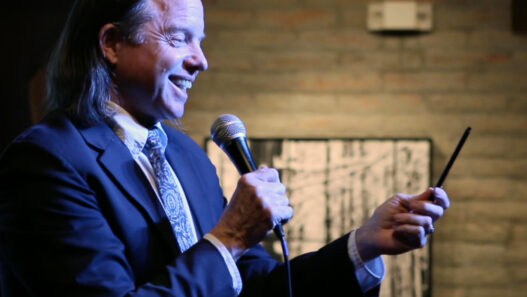http://www.youtube.com/watch?v=pYa3AR9BgCA&t=0m1s
Alright, here we go. So, I’m going to follow the homework master, aren’t you happy? But probably I’ll get distracted and talk too long and maybe won’t even finish the first class, but let’s try. So, here we go. I called the first course … and the fun thing about this teacher training is that I’m going to share with you some of what was happening—why I wrote the courses, you see what I mean?
Like what was happening, or what I was thinking about, if I can remember. So, the first course is called the Principal Teachings of Buddhism, but the real book that I translated is called Lamtso Namsum (Lam-stzo rnam-gsum). Say Lam tso nam sum, which is short for lam gyi tsowo nam sum. I was teaching Masha a new word yesterday, where are you? She’s disappeared. The pet peeve, what’s it mean? Did she get it right Joel? My pet peeve. No, I taught her an American idiom yesterday. I’m the American idiom teacher for a lot of my students. “Pet peeve” means the one thing that irritates me a lot, and it’s people who misspell Principal Teachings of Buddhism. So, if you want to fail your teacher training course, just spell it wrong. Okay, so let’s talk about it.
http://www.youtube.com/watch?v=pYa3AR9BgCA&t=1m50s
Principal (pal) means main—main teachings, and it’s an adjective normally, except for the Principal of a school, which is a man or woman who’s the boss of the school. But principal teachings, you’re going to spell it with (pal) which means “main teaching”. What’s principle mean with a (ple)? It means an important idea, like the principle of gravity, or the principle of relativity. So, get it straight, don’t embarrass me in front of your students.
I’ve seen many teachers do that, we’re talking principal teachings (pal). Some people have mistranslated it as The Three Principles (ple), but that’s because they don’t understand that the Tibetan word “tsowo” has to come after what it modifies, which is extremely rare. So, “lam gyi tsowo” doesn’t mean the “principles of the path”, and many people have translated that way, so you can just throw the book out if you see that at the top. You don’t know how many books I’ve thrown out that way. So, unfortunately the word “tsowo” which means “main/primary”, principal (pal), always comes after the noun that it modifies. Like “book of red”, rather than “red book”.
 Okay, got it? Just nod. Sometimes the adjective comes after then noun, this is a “dress of red”, meaning “red dress”. Anyway, people got confused and it’s a pet peeve, it irritates me. So, you’re not going to do that. So, Three Main Paths of Buddhism is the real title okay? I changed it to the Principal Teachings of Buddhism to make it easier, more accessible, and the translated book with Tsongkapa on the front is called The Principal Teachings of Buddhism, it’s not called The Three Principal Paths, and it was meant to make it more accessible. By the way, that painting, or that statue, on the front of that book, is a real image of Tsongkapa. It’s the only one, so it was a real statue of Je Tsongkapa and it’s got a big nose and big ears, and that’s the way he was. His enemies called him “Mr.Big Nose” and he had a very big nose. His face was very strong, fuerte, and that’s a real picture. That statue was destroyed during the Cultural Revolution, and they made another one that’s all pretty and handsome, and that’s not the real one okay? So, that’s why it’s black and white because the photograph was taken in the in the late 1940s or something like that.
Okay, got it? Just nod. Sometimes the adjective comes after then noun, this is a “dress of red”, meaning “red dress”. Anyway, people got confused and it’s a pet peeve, it irritates me. So, you’re not going to do that. So, Three Main Paths of Buddhism is the real title okay? I changed it to the Principal Teachings of Buddhism to make it easier, more accessible, and the translated book with Tsongkapa on the front is called The Principal Teachings of Buddhism, it’s not called The Three Principal Paths, and it was meant to make it more accessible. By the way, that painting, or that statue, on the front of that book, is a real image of Tsongkapa. It’s the only one, so it was a real statue of Je Tsongkapa and it’s got a big nose and big ears, and that’s the way he was. His enemies called him “Mr.Big Nose” and he had a very big nose. His face was very strong, fuerte, and that’s a real picture. That statue was destroyed during the Cultural Revolution, and they made another one that’s all pretty and handsome, and that’s not the real one okay? So, that’s why it’s black and white because the photograph was taken in the in the late 1940s or something like that.
http://www.youtube.com/watch?v=pYa3AR9BgCA&t=5m18s
Alright, so the first course is based on the Principal Teachings of Buddhism, which is more correctly called The Three Principal Paths of Buddhism. The Three Principal Paths [for short]. Now, path is lam in Tibetan. What is it in Sanskrit? Marga. In this case, [marga] doesn’t mean “a road’, and it doesn’t mean “a method”. In the Prajna Paramita teachings, [Geshe] topic number 4, “path” is a synonym for “understanding” or “realization”, it means a mental state. So, we’re not talking about three methods of Buddhism, we’re not even talking about three ways that you can go in Buddhism, we’re talking about three attitudes. Okay got it? And that’s very important, if you don’t understand that you don’t understand the course.
We’re not talking about three methods, we’re not talking about three routes along a highway, we’re talking about three attitudes that are the principal teachings of Buddhism, got it? So we’re not talking about books, we’re talking about ideas, three big ideas, and that’s something you should know.
http://www.youtube.com/watch?v=pYa3AR9BgCA&t=6m37s
1) Name the author of the Principal Teachings of Buddhism (give both his popular name and his monk’s name), as well as his dates.
The author is? Je Tsongkapa. “Je” means “Lord”. It’s an honorable name like Lǎoshī, but 老師 is like elder teacher right, or something like that? It’s like that. It’s Je. Je means for example diamond is called “dorje” in Tibetan, which means “king of stones.” “Do” means stone, “Je” means “Lord”, so Je Tsongkapa means Lord Tsonkapa, it’s a respect word. So, you can call him Tsongkapa, but it’s a little bit impolite, and if you call him Je Tsongkapa it’s more polite. Sometimes we call him “Je Rinpoche “, which means precious Lord. Rinpoche means you’re like a jewel, so if they say Je Rinpoche they’re talking about Tsongkapa.
You can use either one, it’s kind of weird to say Tsongkapa. Then a lot of people spell his name with a (kh) Tsongkhapa. Many many people. That’s a pet peeve of mine. They are confusing the transliteration with the sound. When you take a foreign word and you put it in English, you put the sound. You don’t try to capture the spelling in the in the original language. Got it? Otherwise you end up with things like “Sri Lanka” or “Sivananda” yoga center, which is mistaken, they’re both mistaken. They are failed transcription, they are not the sound. Got it? It’s a weird mistake. If you see a book that has “Tsongkhapa” on the front, just throw it out. It means the person who wrote it doesn’t understand the difference between transcription and pronunciation. What’s the transcription for Moscow? Moskva. Moskva is the transcription, got it? We pronounce it Moscow okay?
Don’t put the spelling of the foreign language, put the sound. Tsongkapa, just “k”, there’s no reason to put “kh”, they messed up my Lama’s name at the passport agency. He’s Tharchin, okay? Because they saw the “th” in the transcription. It’s so terrible to ruin someone’s name because you can’t tell the difference between the character and the sound.
Understand okay? You’re never going to do that, or I will get irritated … more irritated. Now, his monks name, I’m just working from the homeworks, is Lobsang Drakpa. Lobsang means pure mind. “Lo” means mind and “sang” means pure, and “b” as a prefix letter, Lobsang, pure-minded one. Sumati in sanskrit. And his last name is Drakpa, which is what in sanskrit? Kirti, like Dharmakirti, Chandrakirti. Kirti means “famous”, everyone’s heard of this guy, he’s amazing. Super popular. So, his name is “pure-minded super popular”. That’s his monk’s name. Now, in the rules of monks names you take the first name of the person who made you a monk.
The normal abbot period in Sera Mey Monastery, for six hundred years, is four years. So, during those four years if the abbots name is Mike, then every monk who’s made that four years has the first name Mike. We had a big problem at Sera Mey because the abbot stayed for three terms, twelve years, half the monks in the monastery are called Jampa, and it’s really confusing. So, my first name, monk’s name, is Lobsang, and ultimately I come from Tsongkapa. My teacher, teacher, teacher, teacher, teacher, got it?
http://www.youtube.com/watch?v=pYa3AR9BgCA&t=11m19s
2) What is the actual name of this work?
Number 2, what’s the actual name of this work? Three Principal Paths. You know that. It’s not The Principal Teachings of Buddhism, but it’s the same “pal”.
http://www.youtube.com/watch?v=pYa3AR9BgCA&t=11m36s
3) For whom was the work written (monk’s name and popular name)?
Question 3. We’re working through homework number 1 yay! Now, in Christian tradition there’s a big emphasis on epistles. What’s a epistle? It’s like a heavy letter, like a letter that became a classic. The letters of Paul right? The epistles of Paul, which caused a lot of trouble, he wasn’t even there. Okay anyway, epistle means sacred letter, important letter. So this book, the fourteen verses, is a letter that was written to Tsongkapa’s student named Nawang Drakpa. You’re supposed to know that, and you can read it in the reading.

Now, Nawang Krakpa had a crush on Tsongkapa from the beginning, there’s many paintings of Nawang Drakpa sitting at his feet, so what did Tsongkapa do? “You go to East Tibet and build a hundred and eight monasteries”, and he’s like, “what??!” But he wasn’t one of those lazy disciples, he did what his teacher told him to do, even though he didn’t want to go. That’s the last thing he wanted to do was leave his teachers side, but Tsongkapa said “go, and don’t come back until you’ve got 108 monasteries”, and he did it, he went to east Tibet and built 108 monasteries.
Guess what’s the name of the last one? Datsang. “Da” means “now”, “sang” means “I reached the full number”. Complete, haha total! The last monastery was called “total”, got it? I made the total. Datsang. And it’s a famous monastery, I used to know the abbot. It’s a good monastery. It’s still running. So this book was written as a letter to his student, who was upset because he got told to go out to east Tibet, and he’s trying to, what do you call it? Soften him up a little bit yeah. “Don’t get irritated with me” you know? “Here, I’ll give you a nice summary of all of Buddhism in two pages”, he’s like, “yeah okay, that’s cool.” By the way, for $50. Okay, I’m not saying you’re interested in money and not Dharma, I’m just saying it makes it more fun for me okay? Frankly, it’s more fun for me.
Ready? In the ACI 18 Foundation Courses there’s another important letter sent to Nawang Drakpa. Why? What’s the letter say? Yeah. Nawang Drakpa made the first monks in East Tibet, and he wrote a letter to his teacher and said, “look, I not only built monasteries, I ordained a bunch of monks.” And? This is the answer by Tsongkapa.
Don’t say, “yeah”. You want money or you don’t want money honey? Okay, he forgot. I saved the money, cancel that one Shao Ping okay? You just lost 25 bucks. Okay, he told his student, does anyone remember? Come on! Yeah. “You want to meditate, it’s not the seat, it’s not the legs, it’s not the face, it’s not the breathing, it’s not the topic, it’s? Yeah! Did you respect other people’s peace of mind last week? Or did you irritate other people? And the letter is incredible, and by the way, in DCI we teach them, in level 3, we teach meditation for like hours after hours, then at the end we say it doesn’t matter. Nothing matters. What you hear in your mind is coming from how you treated people last week. Don’t worry if your left foot goes up first, your right foot goes up first, you know? Can you slouch, can you not slouch, do you exhale long enough or not. Forget all that stuff! If you want to have a good meditation, don’t upset other people’s mind. Be conscious to not upset other people’s mind. Speak kindly to people, speak with careful consideration to how they feel.
Watch their face, if they go like that [grimmace], then back off because you’re planting seeds to hear crap in your mind while you meditate. You’re planting seeds for your mind to go, “yeah what’s for lunch?” That comes from irritating other people, like teaching them Ashtanga [yoga], stuff like that, just kidding.
He [Nawang Drakpa] has a nickname, Tsako Wonpo. By the way, here the [homework] master is mistaken. The old master from 27 years ago is misspelled, his name is misspelled. It’s Wonpo, and Tsako is an area that he came from, like Kansas, Suzhou, or something. It’s some … Dalian, some faraway place. Wonbo means, like a friendly word for local priest. Like the little local priest. Tsako Wonbo, Little local priest from Tsako. So, sometimes you might see his name spelled Tsako Wonbo. I didn’t put his dates, guess what? He lived in the same time as Tsongkapa. Alright, I also try to leave out stuff that is going to overload you. I mean, I could put more and more stuff and we would never finish the course okay? It’d be like the Lamrim okay! The commentary you are studying was written by?
4) Who wrote the commentary that we are studying (give both his popular name and his special name)? What are his dates?
Pabongka Rinpoche, and the whole translation is the course. The whole translation is in the course, the whole commentary is in the course. I translated .. I remember where I translated it. I was on a one month retreat near the Grand Canyon and I remember I translated it there. Dates of Pabongka Rinpoche. 1878 to 1941. Now, he was probably the most famous teacher of the Tsongkapa tradition for that hundred years. He was number one. So, I’ll tell you a little bit about his story and you can read it in the book. So, in the book I got my teacher, Khen Rinpoche Geshe Lobsang Tharchin, to tell me the story about Pabongka Rinpoche, and it was hard because he didn’t like to answer my questions, but I offered to drive him to Washington every month, which is a five-hour drive and he couldn’t get out of the car, so he told me the whole story.
By the way, his nephew who is Geshe Lobsang Thardu was brought up by Khen Rinpoche from childhood and became his main attendant, and he became the khansen gergen. What’s that mean? He became the house mom, the babysitter, for all the monks in our college. There are 12 colleges in Sera Mey, according to the ancient constitution of Sera May, which we found in Russia. The only copy, we found it in St. Petersburg. And there are 12 houses, 12 colleges, inside of Sera Mey Monastery. Sera is divided into two halves, Sera Jey where they’re not so educated, and Sera Mey which is vastly superior [joke]. And there’s a heavy rivalry between the two halves, and there’s a green line in the monastery. There’s an invisible line and you don’t cross it or something might happen okay? Tough stuff happens in the monastery, you have no idea, but you don’t go over that line. So, we’re from Sera Mey, and we don’t like Sera Jey. There’s lots of nice teachers at Sera Jey, but don’t tell anybody.
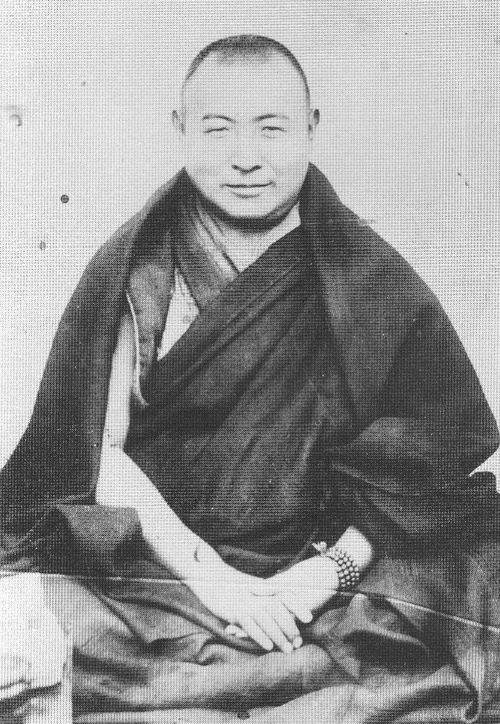
So, anyway Sera Mey has 12 colleges. You’re from Gyalrong College. You are affiliated, as my student you are affiliated with Gyalrong College. So, in the structure of Sera … of of all the great Tsongkapa monasteries, there are “local houses”, meaning … when I went to Princeton we had an Arizona Club, and all the students from Arizona we used to drink beer together, stuff like that okay? And so in the monastery there are local houses, and Gyalrong is East East East Tibet … their language is totally weird and not quite Tibetan. So anyway, for some reason my teacher was put into Gyalrong house by his uncle or something at the age of 7 or 5, and the highest Lama in history from our college is Pabonghka, he’s Gyalrong house, got it? He’s from your college, so you got to be loyal okay? He’s from our College, which is a great honor to be from his house, and I had the honor of debating with the third one. The third Pabongkha was doing his Geshe the year before I did my Geshe, and he’s from our college.
Tradition in the house is you have to defend yourself for the Geshe examination in your house before you defend yourself in the monastery, before you defend yourself in Sera, so he had to defend himself in our college and we only had 50 monks there, but the person who attacks him first is the senior student who’s not a Geshe yet, which was me. I was supposed to attack him first. So, I’m attacking Pabongkha in the debates and that was my job. Guess what question I asked him?
After you get enlightened and you become a Buddha, how can you help suffering beings because you don’t have the karma to see people suffering anymore? You see them as high-level bodhisattvas, all beings become high-level bodhisattvas in your heaven, so how can those people help suffering beings after they become a Buddha? It’s they all became humans instead of dogs you see? [using the pen example to understand emptiness] So, there’s no chew toys, got it? In the universe for them. So we started like that, and I was really getting him, but when the opponent is a high Rinpoche and you’re just a schmuck, the debate master will call off the debate. He’ll say “O la so”, which means “okay next!”, and I was like “I got him, I got him” he says “o la so”, and I’m like “dang!” And then we went on the porch and continued the debate for 3-4 hours, and it was cool.
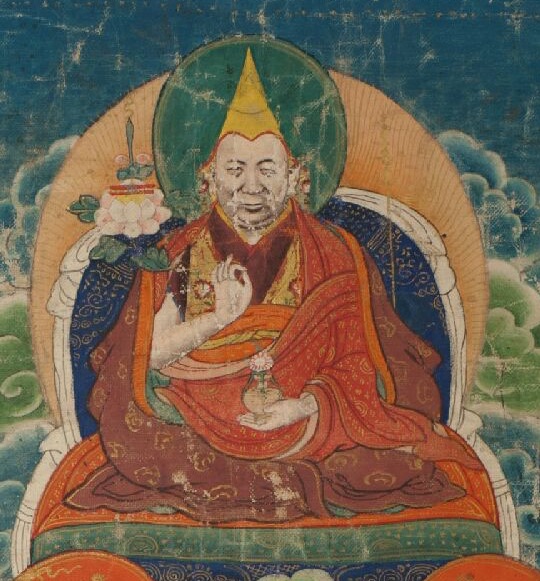
And the abbot of the Tantric College was with us and we … okay … O la so! Anyway, that’s Pabongkha Rinpoche, he has a nickname in the secret teachings, in the Diamond Way teachings, we don’t call him Pabongkha Rinpoche, we call him Dechen Nyingbo. Dechen means the bliss that’s associated with seeing emptiness in Tantra. Great bliss, and Nyingbo means Xīn, heart. Heart of Bliss. So, that’s his secret name, but sometimes you’ll hear him called Dechen Nyingbo. He was the greatest teacher of his time. He graduated from my monastery, our monastery, Sera Mey from Gyalrong house, but he was not a high Geshe, he was not a number one Geshe, he was like a number three level Geshe, which is what I am. If you want to be a number two level you have to wait another four years, if you want to be another one level it might take 10 more years and I’m too old, and I probably couldn’t do it anyway. So, it’s much more examinations, but it’s interesting that he was also a third-level Geshe, he was not a high level Geshe. He did something strange which is that he started teaching normal people, and it was very very unusual, and then ten normal people … not monks came to his class, then twenty came to the class, then thirty came to his class, by the time he taught the Lamrim you’re studying in the morning {A Gift of Liberation], there were a thousand people in the room.
He became famous for teaching normal people, he was the DCI of his time, and the ACI of his time, and he got heavily criticized, very very heavily criticized, and it was a very serious thing. You could be murdered in those days, and he he stuck it out. You’re going to see two photos of him. One is a young handsome guy okay, then five years later he looks terrible, he looks like somebody beat him up. And they say he was attacked by spirits, he had like a one-year war with a bunch of spirits and it cost him physically. He never recovered physically, you can see the two photos, it’s very interesting. So that’s the story.
So, he used to come to monasteries and teach the Lamrim, which is what you’re studying in the morning, maybe for a month, and that’s, by the way, how a Geshe gets the Lamrim teachings. You get them because a lama visits and teaches them extra-curricular, it’s not part of the program—it’s dessert. They will cancel all the classes for a month, and some high high Lama will come, like Pabonghka Rinpoche, and he will teach the Lamrim for a month, and then they’ll invite all the local people to come and that’s what’s happening in the morning, that’s what you’re hearing in the morning.
So, then there’s a nyerpa. Nyerpa means the refreshment person, and you’re … okay, a monastery kitchen, like at Sera Mey, we have to go serve in the kitchen, every two weeks we have to spend two days there, something like that, when you wash the teapot you need a ladder to get up to the top, and then you need another ladder to get in and then you clean it, it’s tea for 3,000 people. And so that’s the nyerpa, the nyerpa runs the tea at the Lamrim teaching which has a thousand people. Everyone’s got to get tea, everyone’s got to get tsampa porridge. So, my teacher … and by the way, they usually only pick the lazy monks, you don’t pick the Geshe candidates because they’re too busy. So, they have a miksel. Miksel means they don’t have to do the dirty work in the monastery, they can just study all day. They’re pampered, the good Geshe candidates are … you don’t bother them, they don’t have to work like other people.

My Lama was a goofball. Goofball means bad boy, never studied, just played tricks on people. His favorite trick … you know thumbtack? Like small nails, so people in Tibet inside the monastery they don’t wear shoes, understand? He would spread thumbtacks all over just for fun then he’d watch them you know? And he was really naughty, he was really bad. Pakda, say pakda, “pak” means little piece of flour, like you make flour and then you make little balls like that … and then when you’re in the prayer, 3000 guys, they’re all going …. sangye chudang tsokyi choknam la … when they go waaah, and you go [shooting dough ball sound], you know like 10 feet away, three meters, [shooting sound] and he was the best, my teacher was number one, and he didn’t study, he didn’t do anything, so that’s why he got stuck with nyerpa, he had to make refreshments and he was doing it and Pabongkha visited the kitchen, to check on the refreshments for the teaching, and he saw my teacher and he walks over to him and he puts his hands on his head and he says, “this one is special, this one is special”, then he just turned around and left. Yeah! And then something weird happened to my teacher and he freaked out, he got some kind of … I don’t know what, spirit from Pabongkha and he changed totally, and he was offered a very important position, very good money, big temple, the rest of your life you drink tea and eat offerings, and he said no. He told his teacher, “no I’m not going” he said ‘you’re a fool, you know the rest of your life you’re going to be wealthy, it’s a good gig.”
And he said, “no I want to be a Geshe.” He said, “you a Geshe?!” And my teacher said “I’m going to be a number one Geshe!” He’s like, “number one Geshe, yeah, yeah right!” “When you become a number one Geshe, I become the throne holder of Tsongkapa!” My teacher got pissed off and he worked really hard, and he became a number one Geshe, and then in his year they had a competition of all the number one Geshes, and he beat all of them so we call angi dampo, he was number one of, I don’t know, 20 thousand monks in the debates. So, try to win an argument with him, you know? If he says the sky is not blue, he can prove it, you know don’t even try to fight with him, just go around him understand? Ok, I still do that.
http://www.youtube.com/watch?v=pYa3AR9BgCA&t=33m13s
5) Who was this Lama in his former life?
Okay, now “pabong” means “boulder”, and it’s a special hermitage, retreat center outside of Sera, you can walk to it, you have to hike to it. It’s like Diamond Mountain, it’s very similar to Diamond Mountain, so that retreat center was called Pabong, so he was called Pabongkha, but he was not Pabongkha okay? They decided he would be the incarnation of the abbot of Pabong, but he wasn’t so what’s the story?

He’s actually recognized as the reincarnation of Changkya Rolpay Dorje. A very very famous lama of the emperor of China, and there’s still a temple in Beijing, and I’ve seen it, dedicated to Changkya. So, this is a very famous teacher of the king of China, the Emperor of China, and still the that temple is there, I’ve seen it, you can see it from the hotel if you get to the 20th floor because it’s surrounded by other buildings, and it’s really cool. Then, he was very friendly with China and he really got along with with the Chinese, so in the year that Pabongkha was born there was a lot of tension and people were afraid to call him his real name, Changkya, so they called him Pabongkha. They named him a different name because there was so much political tension. Anyway, that’s who he really is. 1717 to 1786. Changkya, this Changkya, very very famous, and he wrote four volumes … Siddhanta, mister Word for zero dollars!
Yeah, a study of all the schools, we kind of did a Siddhanta yesterday okay? But he wrote the biggest and the most famous. In his past life. Alright now, Pabongkha Rinpoche had a special student okay, who wrote down his teachings and these are the days before iPhone recorders, and people were taking notes like crazy and the Lama’s just teaching, no microphone. A thousand people, you had to have a big voice.
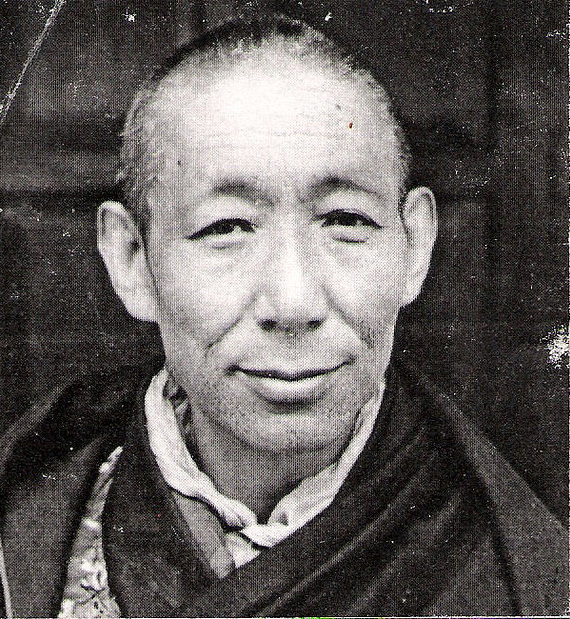
So, his student was a high Lama called Trijang Rinpoche. Born 1901, passed away in 1981. And Trijang Rinpoche became the highest Geshe of his time and taught the Dalai Lama. He was the Dalai Lama’s teacher and he was an amazing kind person, amazing scholar, amazing teacher, and why we have the Gift of Liberation, why we have that book, is he spent 12 years editing those talks, and I believe it’s the greatest book ever written in Tibetan okay? It’s the sweetest Tibetan language that ever was written. It’s perfect, the book is totally perfect.
The Tibetan is exquisite, and they’re … you know nowadays because of the Cultural Revolution etc., the level of Tibetan in Tibet is low, it’s … I called a monastery many years ago to find a book, no one could speak Tibetan okay? So, I believe that’s going to be the greatest book ever written in Tibetan, and it was edited by Trijang Rinpoche. Trijang Rinpoche was my teachers root Lama, so you’re Trijang Rinpoche’s great grandkids. It’s a good lineage.
http://www.youtube.com/watch?v=pYa3AR9BgCA&t=37m27s
6) Who is the disciple of Trijang Rinpoche who wrote the introduction? Give his full name and correct titles?
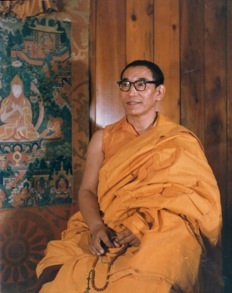
So the person who wrote the introduction to your course, and it’s on your homework, is Khen Rinpoche, Geshe Lobsang Tharchin, my teacher. Born 1921, passed away 2004, and he taught me for free for 30 years, and I lived with him for 25 years. And it was hard, he was a hard person, you could never win an argument, he never once told me I did something right. When I finished my Geshe, first foreigner in 600 years, he’s like “huh” … so his nephew was his closest disciple, and I’m pleased to say he’s going to visit this week.
He’s very old now, he’s about 80 and we put him on a plane, he agreed to come, and I asked him to give a teaching about Khen Rinpoche, who is your grandfather. And just to tell us about his personal life, like tell us some nice stories. Geshe Lotar is his name, he’s not a high Geshe, he’s not a great scholar, but he’s a great storyteller, he’s like the best I know. He did become the debate master of Sera Mey, which is kind of like assistant abbot, it’s vice abbot. So he did reach this position, and he helped me survive in the monastery.
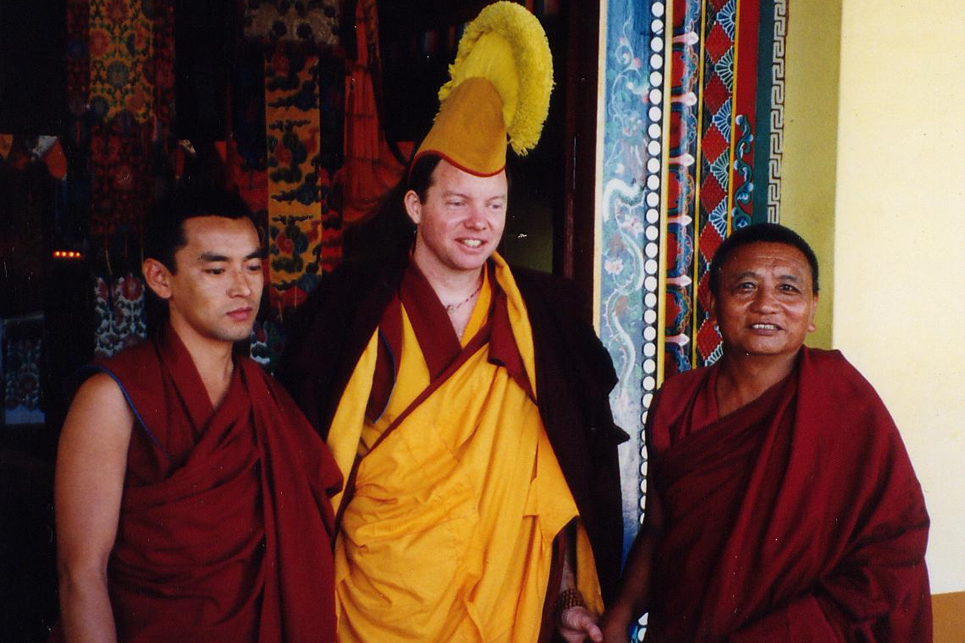
Without him I wouldn’t have survived, I was the only foreigner to survive in Sara Mey still, in 600 years, and it’s only because he was so … he’d say, “the green line’s there, don’t cross it, don’t cross it, don’t walk over there”, I’m like “I don’t see anything”, He’s like, “trust me”, you know? And my whole career in the monastery is due to him, he taught me to tie my robes, you know everything. Dressed me up for the Geshe exams, it’s like getting married. No, it’s like three layers of stupid historical stuff, so you should be grateful to him, you should make him some nice offerings okay? Red envelopes, and you should respect him. Without him I wouldn’t be here. And he taught me to speak Tibetan because he never stops talking, which is probably good luck for me. We lived together for about ten years, so he’s good. You’re going to get a nice … and I don’t think he’ll be able to come again, so I think it’s kind of a special chance. What day is that Tim? Yeah, he’ll be staying here but he’ll give a lecture on Saturday morning. So, anyone’s welcome to come.
http://www.youtube.com/watch?v=pYa3AR9BgCA&t=40m40s
7) What are the three “problems of the pot”?
Now, the text doesn’t jump right into the three principal paths, it starts with some preliminary material which is traditional. One of them, perhaps the most traditional thing to say first is as you listen to this teaching avoid the three problems of the pot, which we covered in? Kamalashila, so there … as long ago as the Tang dynasty, Tang Cháo, 700’s. Xuanzang? 1,300 years ago, as early as that, they were talking about this idea called “the three problems of the pot”. For zero dollars! Ok, 1 dollar, give me any of them, give me one each, raise your hand and give me one. Don’t yell. Ok, Jasso. Yeah okay, somebody else!
You do that in the Geshe debates and you’re in trouble, huh? Yeah, you can’t pour water into a dirty cup. So, what’s it mean? Let’s do the other two, yeah, give me another one. Yeah, don’t be like a cup with hole in the bottom. The teacher teaches, and teaches, and teaches, and it leaks out, and I ask you a question the next day and you’re like ‘huh?” What was yours? Did you have another one? Yeah, upside down. The teacher tries to pour in the stuff, but you’re already full with with other ideas, you know you went to some shaman ayahuasca ceremony and you’re not open to these ideas, these three ideas.
You’re already off on some strange thing okay? I had a student from Ireland, she she actually translated the mandala offering into Celtic, and it was amazing. She was a very good student here, and then she went to a ayahuasca ceremony and she said I’m going to record it, she turned on her video, they overdosed her. She died on the video, you can watch it. Okay, stupid idea, got it? Don’t fill yourself up with dumb “spiritual”, you know, okay got it? You can talk to her father who’s the head of the Ireland group. Sad, very sad. So, anyway don’t be like a pot … the three things you should go into the teaching … before the teaching starts, be open, I’m going to learn something new, I’ll be open … it’s not what I’m used to, but I’m open to it. It’s like the yoga class we had this morning, the teacher said … first thing he said, “look I’m going to do stuff you didn’t do before, just be open okay?’ That’s the first pot, be open to it.
Yeah, second one is: don’t mix it up with other stuff, and as an ACI a teacher if you mix it up with other stuff I’ll kick you out in five minutes okay? You mention ayahuasca in a ACI course, and I will kick you out, clear? Do I have to say it again? Ok? You’re teaching ACI alright? Now, does that mean you can’t teach something else next week? No, I’m not like that. I understand everyone in the room comes from a different tradition, maybe you’re from a Jewish tradition, maybe you’re from a Christian tradition, maybe you’re from a Muslim tradition, and maybe you’re going to be teaching in a Muslim country, then say cool stuff about Muslim okay? That’s fine, but don’t do it in the middle of the course, don’t mix it with this course. This course is ACI, this course in Tsongkapa, it’s a formula for enlightenment, if you add ayahuasca it won’t work anymore, people will fail, people will suffer for more billions of years got it? Okay, so I request, I don’t request, I order! Don’t mix other stuff with ACI, it doesn’t mean you can’t teach other stuff, you want to teach something else, do it next week. Don’t do it in the middle of the ACI class okay, understand? I request, no I order, and I will remove your certification if I find out you’re mixing it with other stuff.
It’s a formula, it works, I can tell you it works, it happened to me … stuff happened to me that is extraordinary, unbelievable, so no one in the world can talk me out of it, people have tried, and I just laugh, you know like, “what are you talking about?” “You follow this correctly, you can see the whole universe in your meditation, you can meet every living creature, billions, you know, don’t tell me ayahuasca.” I’m not interested. Then they’re like, “Yeah but Geshela”, and I’m like “yeah but get out!” I’m not interested, you know? I already have a Model X, don’t try to sell me a Volkswagen bug, okay? And I’m not sectarian. I tried it, it worked, I got what I wanted and I say you can do it too, but not if you mix it up. You’re going to ruin the recipe, understand? Okay. It’s not because other traditions are bad, it’s not the point. You don’t put a mapo tofu recipe with a chocolate cake recipe right? One is a spicy one, it’s not going to work out, it’s going to be the worst thing anyone ever made. Mapo tofu is nice, chocolate cake is nice, don’t mix them.
Let’s do one one day and serve it to everybody, wouldn’t that be fun? Luca, no? Let’s serve it tomorrow in class so people remember what I said, you’re all going to throw up. Mapo tofu chocolate cake. Maybe I’ll make it just just so you remember, you’ll tell your students, “yeah, your grandfather Lama Geshe Michael, back in the old days, he made us eat a chocolate mapo tofu cake, and it was terrible, so please don’t mix up the teaching.” Okay, who’s going to make it, Candy you want to make it? Come on! You guys are … I better teach lama … obeying your lama here um … okay.
http://www.youtube.com/watch?v=pYa3AR9BgCA&t=48m24s
8) What are the three great divisions of the lam-rim texts (works on the Steps to Buddhahood)?
All Lamrim texts have three great divisions, the teachings A to Z, one two three, step four, one two three four five, how to get to Buddhahood, have three big divisions, and they depend on the motivation of the person in the class. Kyebu chung, kyebu dring, and kyebu chenpo. They’re called little people, middle people, and big people okay? Literally the word is little people, medium people, and big people. Now, it’s just a difference of motivation. Who’s going to tell me little people’s motivation? It doesn’t refer to your height, it refers to your heart.
Yeah, I don’t want to go to the lower birth. I don’t want to be reborn as an animal, in the hell, or as a spirit. I don’t want to go through the lower births. That’s little people’s motivation. For a hundred, three hundred? I’m spending too fast, right Shao Ping? I’d make it a thousand … hmm … okay thousand bucks, but I pay you later, seriously, what’s the one teaching that would satisfy a small person, what they want? You owe me a thousand. I’m ahead already. Sheesh! Good, cancelled! Ahh.
The pen. A person who understands the pen teaching correctly cannot go to a lower birth. It’s not possible okay? You destroy all the seeds in your being that would send you to a lower birth, and can you imagine people complain that I teach it too much! They’re going to thank me later. If you understand the pen correctly, jor lam supa is the technical term: the mastery level of the path of preparation, which is when you have a deep understanding of the pen, and the holder of the pen by the way. You cannot go to the lower realms, it’s not physically possible, okay cool? So forget “little person” you already passed that. What’s medium person?
Yeah, I don’t want any kind of samsara. I don’t want any kind of suffering life. I don’t care if I become President or I become a garbage man. It all sucks, I don’t want any of it. I want nirvana for? Me. Okay, then that’s a hint about the big person. Big person wants? Yeah, yeah they want everyone to be enlightened. Bodhisattva. So, these are the three great divisions of the Lamrim teachings.
http://www.youtube.com/watch?v=pYa3AR9BgCA&t=52m06s
9) Name the three principal paths.
Question nine: name the three principal paths. They are called renunciation, which is a big English word that nobody uses. It doesn’t pass the waiter test. What’s the waiter test Shao Ping? Loud! Good. When we decide in our translation team whether to use a word or not, I send Allison to the Mexican restaurant and I say, say to the waiter, “what does renunciation mean?” Say to the waiter, “I’m Chinese, look, I don’t know English very well, what’s renunciation mean?” If the waiter can’t answer you, don’t use it in your translation, but I did because that was 27 years ago, and that’s what I was taught alright? And it’s not a great translation. Renunciation, okay now follow me okay? Now we’re going to do content.
Renunciation means: I will not ride in a fancy car, I will not have a lot of money, I will eat only dal and rice, and bananas. I will live simply, I will not dress in nice clothes. This is the classical meaning of renunciation, and it’s not what we want you to do. We talked about it yesterday, if you practice Buddhism properly you will be successful whether you want to be or not, and you can run but the money will follow you. I’m sorry okay? And fame, and clothes, and cars, they will chase you down the street. You can’t avoid them, if you understand seeds, and you plant seeds only to serve other people, you will still be super successful, I’m sorry.
Okay, how many of the great saints of Buddhism were princes? Shantideva, Asanga, Siddhartha, okay? Atisha, come on! Okay, got it? So it doesn’t mean you have to run away from money, cars, and girlfriends. It doesn’t mean that! It means: recognize that if you don’t figure out the seed system everything around you is going to collapse and die including you. If you don’t figure out how to plant more seeds than you use up, you will die, and you will not have money, and you will not have a partner, and you will not have happiness, okay?
It doesn’t mean you shouldn’t have a partner, or money, or happiness, it doesn’t mean that, got it? That’s not renunciation. I tried to go to a cave, I did go to a cave, I spent I don’t know, a month in a cave, it’s not a good place, there’s bugs, I had a highly deadly rattlesnake, a green rattlesnake, bite you once you’re dead, there’s no cure. I had a wolf come in, I had spiders crawling over me all day, it’s not cool. That’s not renunciation. Get a place with a door. If you can find a cave with a door okay, but I thought somehow a cave would be more holy or something. It’s not, it’s just irritating. Okay got it? I like to say, I like a small house, but I want it elegant okay? Why? I hate cleaning.
I don’t want cleaning, I don’t want a house with five rooms in it. Somebody offered me one recently, you
know his name, and I said no I don’t want it. He keeps asking me, he said I built it for you, I said I don’t want it. I don’t want a house that I have to clean all day. I want a small house, elegant, you know sweet, cool, elegant, tasteful but small, less cleaning. So, that’s renunciation, got it? You can have a nice house it’s fine. It’s not renunciation to wear bad clothes, and to not have a job, and to wander around and stay on other people’s couches. I don’t let those yogi’s in my house. Why? They always leave the refrigerator empty, these “holy” people, they always park on your couch, you go to work to pay for the couch, and then your refrigerator is empty when you come home.
I don’t want you to be like that okay? That’s not an ACI teacher, that’s not a yogi, that’s a bum, that’s a dharma bum. Make your own money, be responsible, that’s a Dharma teacher. I made a list of the best ACI teachers I know, and they’re all responsible people, some of them have families, some of them have high jobs, own own big companies, but they’re responsible, got it? I would say that’s one of the most important qualities. I’m not going to trust you with my life if you can’t feed yourself, you see what I mean?
I’m not going to trust you with my spiritual life if you can’t figure out how to make fifty dollars a day. Understand? Got it?
http://www.youtube.com/watch?v=pYa3AR9BgCA&t=58m17s
Second one, okay so first principle path, call it renunciation because I don’t want to change all the [homework] masters, but what it means is: I’m tired of seeing the suffering of the world, I’m tired. I’m tired of it. I’m tired of it, that’s all. I can’t take it anymore. These wars in Syria, in Israel, Orit’s friends got a missile dropped on them a few days ago. I’m tired of seeing this stuff. I’m tired of these crazy things going on, I’m tired of people dying all around me. I’m tired. That’s the first principle path. What are you going to write on homework? I’m tired.
That’s all I could take, I don’t want it anymore okay? I don’t want people dying around me, it’s so lonely, my old lady, her worst suffering is that she’s the last one, there’s no one she can call, they all died. And it will happen to us, it will happen to you, there will be a day when the the last person from this training dies, so I’m tired, I don’t want to see this anymore, I want to fix it. That’s the first principle path, got it? I’m tired. If you want to show off your English put renunciation, but I’m happy to take “I’m tired” on the homework, I’m tired of this stuff, let’s fix it, let’s stop this. There are planets where they stopped it, there’s whole planets where people studied ACI and no one dies anymore, and no one has to meet irritating people anymore okay? Everyone has a model X, until model Z comes out. Everyone’s happy because they understand Buddhism, and every planet goes through this evolution. Some are already finished, some are halfway through like us, and some didn’t get Buddhism yet okay? I’m tired of it, that’s the first one, first principal path.
http://www.youtube.com/watch?v=pYa3AR9BgCA&t=60m46s
Second principal path? It’s called bodhichitta, if you see a book that says “Buddha mind” as a translation of bodhichitta, throw it out, okay? They don’t know what they’re talking about. People always give me books at the airport. “Oh here Geshela, here’s a book,” I’m like “oh thanks,” I go through customs and I throw it out on the other side, especially if it says “Bodhi mind” or “enlightenment mind”, come on! It means, ready? The “wish” to become enlightened, it doesn’t mean an enlightened mind, that’s already enlightened, duh! Got it okay? You have it before you become a Buddha, mainly. I want to become enlightened so I can split my body into a billion pieces and help all the people who are suffering of things that I’m tired of. Got it? It’s natural next step.
I’m fed up with seeing people die. Then what are you going to do about it? Hey, I’m going to become a Buddha because then I can split my body and teach ACI in a billion planets, instead of just one country on the internet. Got it? Okay?
That’s all. I call it the Wish for enlightenment, and I capitalized the W. I’m fed up with bodhichitta, “chitta” does mean “mind,” “bodhi” does mean “Buddhahood”, bodhichitta doesn’t mean “enlightened mind”, it’s a bad, super bad translation. That’s a James Brown song, super bad, it’s super bad okay, it doesn’t mean that at all, if you see that in a translation it means the rest of the book is bad also. If they didn’t figure that much out. Pet peeve, bad translations are 90% of my irritation, Word is the other 10%, just kidding.
http://www.youtube.com/watch?v=pYa3AR9BgCA&t=62m55s
Third principal path, if you want to become a Buddha to help all living beings, you’ve got to see emptiness directly, that’s all. Third principal path, call it “wisdom”, but you know in English “wisdom” means like wise person, they don’t drive too fast, they don’t eat stuff with a lot of cholesterol in it, that’s not wisdom, we’re not talking about that, we’re talking about have you seen emptiness directly okay? You CAN be a person like that, if you follow this class, if you follow these teachings, if you do the meditations you learn here, you can become an Arya, you can join Nagarjuna, Asanga, and Tsongkapa. You have everything you need. Everyone in this room has access to the direct perception emptiness, and most of the people outside this room don’t.
Honestly, frankly, you have everything you need to see emptiness directly. If you see it, in the same hour, you see every planet and every person on every planet, and you love them intensely during that hour, got it? Then what else is going to bother you your whole life? How can anyone make you upset or irritated, you know they’re like “I don’t like what you cooked for dinner.” “Hey man, I saw all the billion planets okay, calm down, I don’t care what you think about my dinner” got it? You can’t irritate an Arya … almost, unless you have bad translations and stuff, but I mean what’s there to talk about if you saw your own Buddhahood in the future, you saw the day and you know it’s coming, and then who’s going to irritate you?
I mean if Andrea’s teaches a really heavy yoga class maybe, but come on, isn’t that worth it? Just to do see emptiness so nobody can irritate you, that’s worth it right? That’s worth coming here a bunch of times. So, you can do it and that experience that happens right after you see emptiness directly, in the same hour, there’s nothing like it okay? What happens the hour before you see emptiness directly? Come on! Give me some specifics …
You see a seed opening in your own mind for the first time. In Mind-Only [school] language, you catch the storehouse opening you see? And it always happens like that, okay technically jor lam chu chok, just before you, an hour before you see emptiness directly, for the first time you see that this laptop is coming out of your seeds—coming from you okay, everything. Then who’s going to piss you off after that? Your husband who yells at you? He’s also coming from you. If you want to punch somebody, punch yourself okay, got it? So, all these things happen, you confirm dependent origination one hour before you see emptiness directly, because dependent origination just means: stuff is coming out of seeds in your mind, and you see it directly, why can’t you see it before that?
Geshela’s been teaching you, year after year, why didn’t you see it? It’s too fast, it’s 65 a second, you got to meditate, you’ve got to have good meditation. Good seeds. Alright, those are the three principal paths, let’s review.
http://www.youtube.com/watch?v=pYa3AR9BgCA&t=66m56s
Number one? I’m tired, god bless! I’m tired, okay? Number two? I want to be a Buddha to help the universe, I’m headed for the stars next week, I’m finishing this planet this week, I got it wrapped up by Sunday and then I’m headed out okay? That’s intention, you can say the Wish, capital W, I’ll take it on the homework. By the way, I finished the homework master Tim, it’s like six pages, good luck. I didn’t write the homework for tonight, but I’ll do it by morning okay?
Third one? Yeah, they call it DPE, I didn’t invent that, it’s not so bad. Somebody changed their car license to DPE, direct perception of emptiness. Okay got it? Those are what ACI course 1 is all about, that’s the main subject of ACI course 1. So, all of Buddhism is covered in ACI course 1, why did you do the rest of the courses Geshela? I don’t know, it was just fun.
http://www.youtube.com/watch?v=pYa3AR9BgCA&t=68m24s
10) Are they physical, mental, or are they concepts?
The last homework question, I’m not giving you a break okay, if you’ve got to pee pee, just get up and go okay, you’re allowed. [Question} Yes, but it’s gotta be really good because otherwise I won’t finish the class, okay it’s not good alright … the last question is: are these three principal paths physical, mental, or are they concepts?
Mental, they are attitudes, they’re attitudes, they’re not paths, they’re not concrete. They’re not even instructions, they’re not Sutras, they’re ideas, they’re ways of thinking, attitudes okay? Should have been called the Three Principal Attitudes. Alright, I finished homework one, let me finish … you sure? [Question] Oh okay, three problems on the pot: number one, you’re not open to learning, you’re upside down. Number two, what you hear, you mix it up with other, you know … ayahuasca shaman stuff. Number three, you are leaky. Geshe-la teaches you something tonight you forgot it by tomorrow, got it? You don’t hold it, you don’t retain it.
Okay alright, we’re going to the second homework you guys okay?









